Living in Melbourne, Australia – An Expats Guide

Are you considering living in Melbourne?
There are so many wonderful cities and locations to live in Australia.
Indeed, over the years, the country has consistently ranked high in various global liveability indexes.
Melbourne was named the world’s most liveable city for a record-breaking seven years in a row!! Wow.
The obvious initial attraction is the amount of sunshine it is blessed with.
But every city has its own added unique attraction aside from the great Australian weather.
Melbourne excels in categories like safety, healthcare, and the welcoming nature of its residents.
The city is a constant hub of activity, earning its reputation as a cultural hotspot.
Weekends are sure to be brimming with art, music, and dance, all accompanied by Melbourne’s renowned coffee culture.
Here we delve deeper into why Melbourne is a great place to live and such a popular ex-pat destination with people from all over the world.
We will also delve into crucial considerations to keep in mind before making the move of a lifetime.
A Cosmopolitan Metropolis
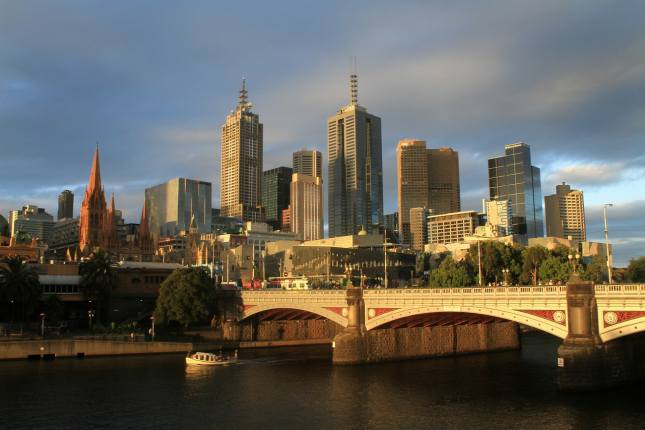
Melbourne Skyline. Image credit: Pixabay
One of the first things you will notice in Melbourne is that remarkably few Australians live here.
In fact, just over 30% of locals are born in Australia.
The rest of society is made up of diverse cultures from over 50 countries, including China, Malaysia, India, England, Vietnam, the Philippines, Italy, Greece, and South Africa.
This multi-national hotchpotch community gives the city its unique global charm and distinctive worldly character.
Mixing with people from all different walks of life and countries means you will have a friendship circle that is unlike any other you have probably ever encountered before.
Cost of Living in Melbourne
Very few of Australia’s main cities are cheap places to live.
Though Melbourne may be considered a tad cheaper than Sydney, it is still on the expensive side.
The costs of housing and groceries, in particular, are generally higher in Australia than they are in a significant number of other places around the world.
As a rough guide:
- A family of four estimated monthly costs are £3,351 (A$ 6,428.) without rent
- A single person’s estimated monthly costs are £942 (A$ 1,808) without rent
Numbeo, the cost-of-living website, has a handy tool you can use to estimate what your monthly outgoings would be if you lived in Melbourne.
Getting a Visa & Residency
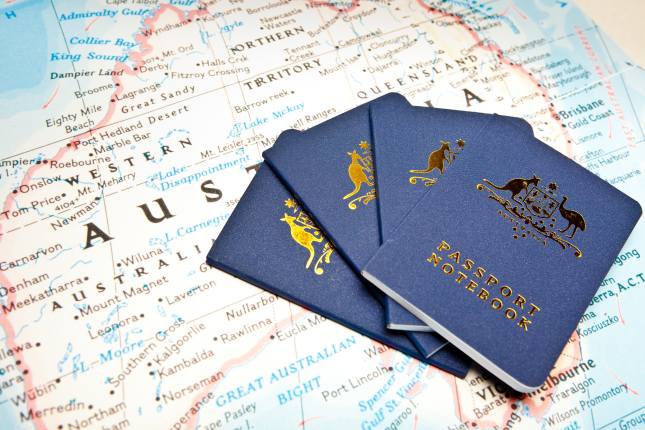
Australian Passports. Image credit: Depositphotos
Before arriving in Melbourne, you will need to organise your documentation.
If you are not already an Australian citizen, you must obtain a visa for living and working anywhere in Australia.
Australia’s immigration system operates on a points-based model, and typically, employers will only consider overseas candidates who can address specific skills shortages.
To become a citizen, specific criteria must be met.
It’s worth noting that Australia permits dual citizenship, so if you have concerns about relinquishing your British citizenship entirely, you can hold citizenship in both countries.
You can find out more information on the Government website HERE.
Working in Melbourne
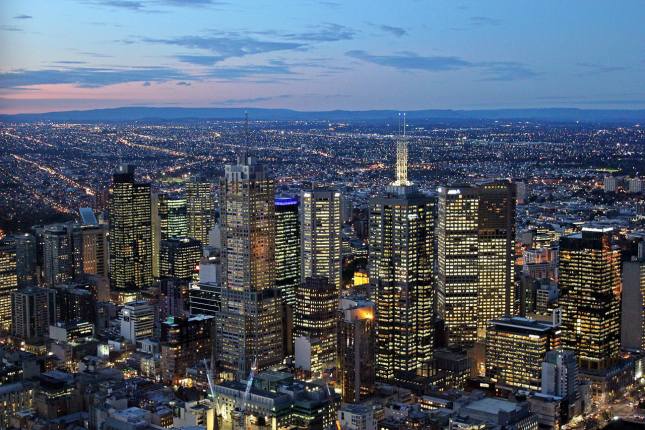
Melbourne’s central banking district. Image credit: Wikipedia
Finding work in Melbourne can be a challenge but, if your profession is on the skills shortages list it can make things a lot easier.
The Australian government issues a list of in-demand skill shortages, and it is well worth investigating.
One of the best options to get into the country is to use a migration agent.
Not only can they assist with your immigration documentation, which can be a complicated affair, but they can also help you find work in Melbourne, update your CV, help you prepare for an interview and much more.
Favourable Work/Life Balance
Melbournians take full advantage of the well-balanced work/life culture living in this city delivers.
It’s normal to see workers leave for home right on time at 5 pm! No overtime, no impressing the boss and stress levels are generally kept to a minimum.
Victoria State provides its workers with the most public holidays in the world, with 13 annual holidays in addition to general leave days.
These clear boundaries between work and personal time make life in Melbourne especially great for families.
Just as well, because there are a lot of child-friendly activities to do and visit, you have plenty of time to enjoy your extra holiday with your family and newfound friends.
Taxation in Melbourne

You will be required to pay tax when moving to Melbourne. Image credit: Pexels
There is no escaping taxation.
Australian citizens, as well as temporary or permanent residents earning income, are generally deemed Australian residents for tax purposes and subject to payment of income tax in Melbourne.
This classification also applies if you are visiting Australia for a period exceeding six months.
Employers play a crucial role in the taxation process.
They are responsible for calculating and deducting tax withholding from each income payment based on your salary and the information provided by the Tax File Number and Withholding Declarations.
As of 2023, these are the tax brackets for Australia:
Earnings Tax to pay
0 – $18,200 $Nil
$18,201 – $45,000 19% of each $1 over $18,200
$45,001 – $120,000 $5,092 + 32.5% of the excess over $45,000
$120,001 – $180,000 $29,467 plus 37% of the excess over $120,000
$180,001 and over $51,667 plus 45% of the excess over $180,000
It is important to note that these are just the general income tax brackets.
Several other factors can affect your tax rate, such as your Medicare levy status, your superannuation contributions, and any tax credits or deductions you are eligible for.
You can find out more about how the tax system operates from the Australian Government website.
Healthcare Provision in Melbourne

Melbourne offers residents some excellent healthcare provisions. Image credit: Unsplash
Ensuring the well-being of yourself and your family is a top priority, and it’s reassuring to know that the quality and accessibility of healthcare in the country are of the highest standard.
As an expatriate, eligibility for Australia’s public healthcare system, Medicare, is extended to individuals who become Australian citizens, permanent residents, or hold a temporary visa (allowing them to work in Australia and have applied for a permanent visa).
Most expats sign on to the Medicare system once eligible. However, Medicare does come with the responsibility of the “Medicare Levy” which must be declared during tax filing.
To enrol in Medicare, you must complete an enrolment form, accessible HERE or from your local Medicare office.
It is not compulsory, but advisable that you not only enrol in Medicare but also seek additional private health coverage.
For a quick comparison of health coverage policies offered by some of Australia’s prominent health providers, consider visiting the iSelect website.
This free service offers an easy assessment of costs, assisting you in choosing the policy that will most effectively cover the needs of you and your family.
An Excellent Standard of Living
Another of Melbourne’s attractions is the high standard of living it offers.
Yet another indictment of its continued popularity with expatriates.
Melburnians enjoy a high quality of life. A large part of this is due to the statewide 30-year infrastructure strategy that affords the people of Melbourne good access to jobs, services, and public transport.
An Incredibly Safe City
The city is regularly sighted in the world’s top 10 cities for safety index.
Melbourne’s incredible safety record can be attributed to a combination of factors, a stable government, low crime rates, and the effectiveness of law enforcement agencies.
Together they ensure a secure and tranquil environment for residents and tourists day and night.
Melbourne’s Weather
Similar to the UK, Melbourne has four distinctive seasons, and, like home, the weather can be very changeable at times. “Four seasons in one day”, as locals often humorously describe it.
Summer (December to February): Summers are warm to hot, with temperatures ranging from 14°C to 25°C on average. Occasionally, temperatures can exceed 40°C during heatwaves.
Autumn (March to May): Autumn brings mild and pleasant weather, with temperatures ranging from 10°C to 20°C. It’s often considered one of the most comfortable seasons.
Winter (June to August): Winters are cool, with temperatures ranging from 6°C to 14°C on average. It can occasionally get colder, especially in the early morning and at night.
Spring (September to November): Spring is characterized by mild and gradually warming temperatures, ranging from 9°C to 19°C. This season sees the blooming of various flowers.
No matter what season you arrive in Melbourne the city’s proximity to the coast and its generally temperate climate make snow and ice a relatively uncommon occurrence.
Melbourne’s Beaches
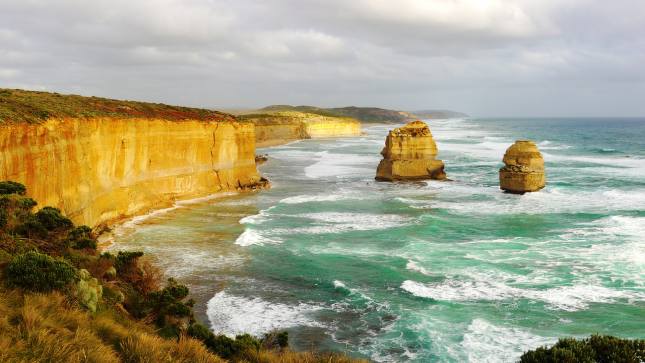
Melbourne Coast. Image credit: Pixabay
Melbourne’s beaches are not as well-known as Bondi in Sydney or Kangaroo Island’s Stokes Bay.
They are not quite as scenic either however, Melbourne still has a pretty coastline ideal for spending your downtime.
There are 14 sandy beaches to choose from.
Notable ones include Brighton Beach.
An ideal spot for swimmers, sunbathers, and surfers alike.
The beach is also just a short walk from all the restaurants, galleries and cafés that make Brighton a very popular upmarket suburb.
Williamstown Beach, or “Willy Beach”. This quaint beauty spot is conveniently located just a short distance from the city.
While it attracts swimmers, sunbathers, and sailors, it’s the breathtaking views that make historic Williamstown a standout destination.
Half Moon Bay is another must-visit.
Just off the shoreline rests the HMVS Cerberus, a battleship from the 1870s intentionally sunk in 1926 to form a breakwater for the Black Rock Yacht Club.
Embracing its namesake crescent shape, the bay offers protection from the elements and is favoured for both swimming and boating.
Escape the City
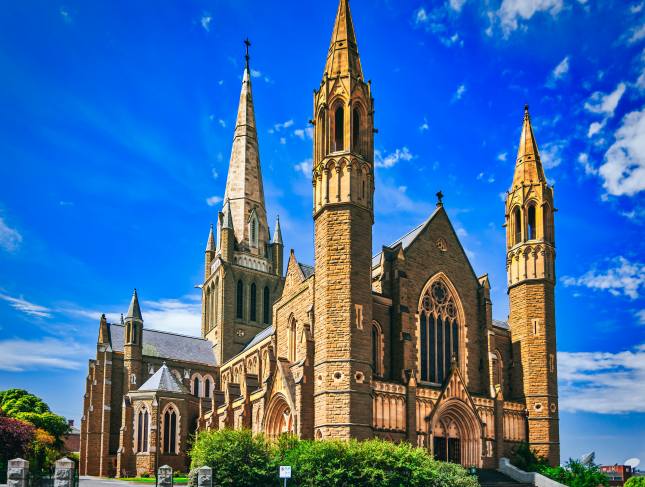
Melbourne is a great base to explore other locations including Bendigo. Image credit: Pexels
The state’s compact size, coupled with its diverse landscape, ensures that exciting adventures are just a short drive away.
Hop on a train and discover regional gems such as Bendigo or Ballarat, or venture into charming smaller towns scattered throughout Victoria.
Immerse yourself in the most beautiful coastal locations or forge connections with ancient rainforests, traverse the renowned Silo Art Trail, follow the sun along the Murray River, or discover the captivating expanses of the desert.
For a change of scenery, witness the magic of snowfall in Victoria’s alpine region, only a four-hour drive away during wintertime. Victoria offers a tapestry of experiences, making it easy to tailor your explorations to diverse landscapes and interests.
All this is within the scope of a weekend getaway from Melbourne.
Meanwhile, getting to farther-flung holiday destinations away from Australia such as Fiji and Tahiti is a breeze!
Even Auckland, Wellington and Christchurch are just a 3½ flight from Melbourne.
A Global Foodie Mecca
Although Australians are inextricably linked with BBQ food, or “barbie” food, the city of Melbourne is also internationally acclaimed as a global haven for food enthusiasts.
There are well over 5000 cafes and restaurants, and Melbourne’s culinary hot spots can be found in some weird and interesting places including back alleys, basements, and even beneath bridges.
Melbourne is known for its multicultural population, and this diversity is reflected in its cuisine.
It provides a huge number of culinary hubs with a wide range of dining options, from high-end restaurants to street food markets.
No matter the location, the city’s food and wine scene consistently surprises and delights both locals and its hundreds of thousands of annual visitors.
Wine Lovers Heaven
Melbourne stands out not only for its exceptional coffee but also for its diverse and renowned food and wine offerings.
Head out of town and spend time in one of the state’s 21 wine regions, known for producing some of the best wines in the world.
The region is renowned for its cool-climate wines, and the Yarra Valley, which is located just outside of Melbourne, is one of the most well-known wine regions in Australia.
Chardonnay, Shiraz, and Pinot Noir varieties dominate the Yarra Valley.
There are so many more unique wines to discover and you can find out more HERE.
Coffee Crazy
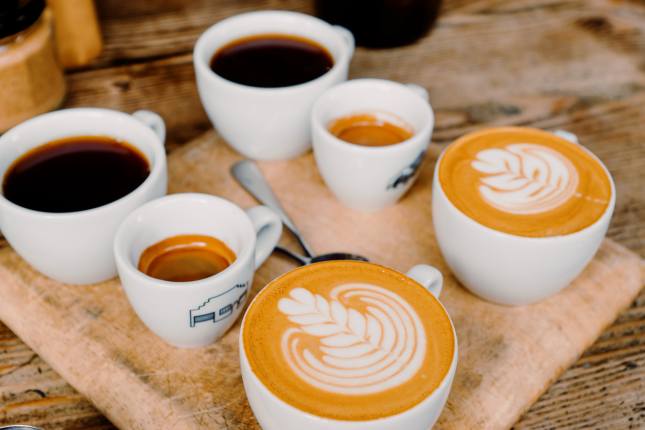
Melbourne is known for its coffee. Image credit: Unsplash
The Australians are absolutely crazy about coffee.
Melbourne is home to some of the most skilled and creative baristas in the world, who are always pushing the boundaries of what’s possible when it comes to crafting the perfect cup of coffee.
Locals rarely opt for the “Costa Coffee” option, preferring to enjoy high-quality espresso-based drinks, valuing both the flavour and the overall coffee experience.
Don’t be afraid to explore the hidden alleyways and side streets of the city. This is where you will find the trendiest cafes, many are housed within quirky and unusual buildings.
Coffee really is a way of life and a true piece of pride for Melbournians.
Best Tourist Attractions
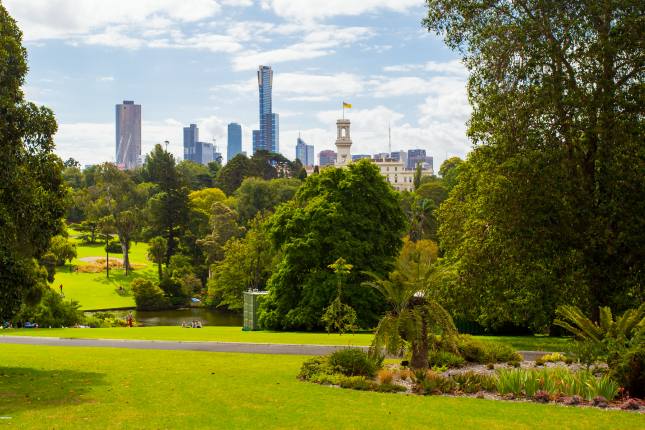
Melbourne Royal Botanical Gardens. Image credit: Depositphotos
Once you have found your feet and settled in, you will have time to explore the city and the wider state of Victoria.
Melbourne is surrounded by an array of unparalleled landscapes, showcasing some of the finest natural wonders globally.
The renowned Great Ocean Road, a world-famous drive that commences just over an hour west of the city offers spectacular views.
The Grampians, sit around 170 miles by road from Melbourne.
Not only do they share a namesake with the Scottish mountain range, but they are equally as impressive.
Within Melbourne itself, you have a myriad of choices when it comes to entertainment.
Melbourne’s best beaches have already been discussed earlier in the article and are ideal whether you want to relax, and people watch, take part in water sports or build sandcastles with the children.
Plus, some of the best restaurants in the city are gathered around the ocean.
Top five attractions in Melbourne
Eureka Skydeck 88: At 975ft tall, Eureka Tower was, until recently, the tallest building in Melbourne and is currently the third highest in Australia. Offering unrivalled panoramic views.
Royal Botanic Gardens: These stunning gardens provide a peaceful retreat near the city centre. Visitors can explore diverse plant collections, enjoy walking trails, and relax in a serene environment.
Melbourne Museum: Situated in Carlton Gardens, the Melbourne Museum offers a fascinating journey through natural and cultural history. Exhibits cover topics ranging from dinosaurs and indigenous cultures to modern Australian history.
National Gallery of Victoria (NGV): Australia’s oldest public art gallery, NGV, is known for its impressive collection of art spanning various periods and styles. The gallery hosts both Australian and international masterpieces.
The Old Melbourne Gaol: Some of Victoria’s most infamous criminals have been housed here, including the notorious bushranger Ned Kelly, and Frederick Bailey Deeming, a suspect in the Jack the Ripper case. showcases memorabilia such as death masks and weapons used by Ned Kelly’s gang. The site also offers ghostly night tours, with the building believed to be haunted.
Australia’s Cultural Capital
The city’s globally renowned and diverse culture significantly elevates its already high standard of living.
Residents take pride in boasting that Melbourne is Australia’s cultural capital, and with good reason.
Melbourne offers an abundance of cultural attractions to explore.
The National Gallery of Victoria (NGV) boasts the country’s largest permanent collection of Australian art, while the Arts Centre Melbourne stands as Australia’s largest performing arts venue, housing the Australian Music Vault and Australian Performing Arts Collection Store.
Adding to the cultural richness, the Melbourne Cricket Ground boasts the Southern Hemisphere’s highest seating capacity.
Numerous international events, including the Australian Open Tennis Championships, the Melbourne Cup horse race, and the Formula One Australian Grand Prix are hosted by the city.
Yet, these celebrated cultural activities merely scratch the surface of Melbourne’s cultural vibrancy. There is so much more to discover
Melbourne Property Market
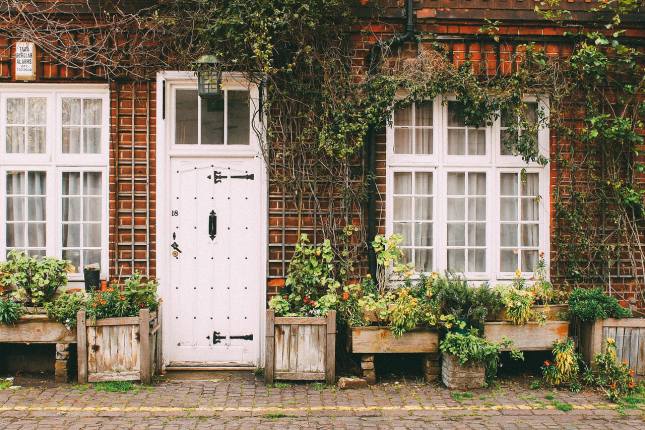
Melbourne is known for its high house prices. Image credit: Pixabay
If you have decided to settle in Melbourne, you will likely want to buy a home somewhere in or around the city.
Melbourne has been known for having a relatively expensive housing market, especially in certain desirable neighbourhoods and suburbs.
The market has been affected in a similar way to the UK with rises in interest rates and high inflation.
Just like in any other country values go up and down in cycles in Melbourne, currently, the market is on the up, cautiously but rising.
As a guide, the average cost to purchase a property in Melbourne as of September 2023, is AD930,000 (£485,370).
Though the average may be expensive, in many areas there are bargains to be found.
Further out is where you will find more affordable homes. Check out some of the best suburbs HERE.
Melton is a growing suburb west of the city where you can buy a three-bed property for around $390,000 (£204,000)
Hopetown, northwest of the city is another good place to conduct your search if your budget is tight. Some homes here are under the $250,000 (£110,000) mark.
As always homes with sea views come with the highest price tags. You can pay well over 1,000,000 for an ocean view in Melbourne.
Popular waterside locations that are not quite as pricey and well worth investigating include Portarlington, Corinella, Warrnambool, Paynesville and Portland.
You must understand the house-buying process in Australia. There may be small variances between states, but when you are spending hundreds of thousands of dollars you want to ensure you have all the relevant information you need.
For a helpful step-by-step guide to buying a home in Melbourne visit the Select Legal website here.
Melbourne Rental Market
The rental market in Melbourne in 2023 is a little crazy at the moment.
Unfortunately, much like the UK, a supply and demand crisis is developing with not enough rental homes available.
Often prospective tenants are offering over the asking rental price.
Although this all sounds very daunting, it just takes more time to find the right place for you.
The good news is that compared to the UK letting a home is cheaper in Melbourne.
As for cost, a small one-bedroom flat will cost around $550 (£287) per month.
You can lease a luxury 3-bedroom apartment overlooking the city for $3000 (£1565) per month.
Using a rental agent is the best way to secure a home.
They assist with your search and help find you a suitable home within your budget and in an area you prefer.
There is a particular process to follow and rent.com.au has a “go-to guide” that is easy to follow.
Opening a Bank Account
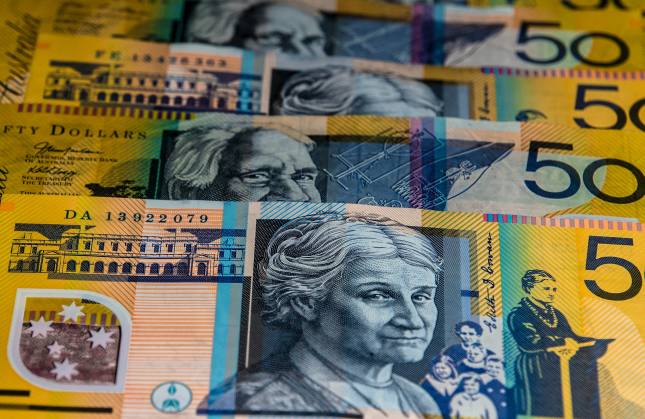
Opening a bank account in Melbourne is easy. Image credit: Pexels
The banking system in Australia is characterized by efficiency, convenience, and a high level of safety. Access to branches with tellers and standalone ATMs is widespread, making banking services readily available in various locations.
In Melbourne, internet banking is particularly popular, with different banks offering a range of online services to cater to varying customer needs.
Opening a bank account is relatively straightforward and best done in person.
- You need to take with you:
- Passport, driver’s licence, or national identity card
- Visa
- Proof of address
- Recent utility bill
- Tenancy agreement
- Tax information (registration from Australia Taxation Office)
- Employer details and salary
Melbourne has branches of all four of the largest banks in the country although there are also smaller banks available.
Foreign Exchange Companies (FX)
The foreign exchange market, commonly referred to as the Forex or FX, is the global marketplace for the trading of one nation’s currency for another.
FX companies can be a really good way of making the most of your currency transfers from the UK to Melbourne.
You may well be planning to stay in the country long-term and will at some point, be transferring large sums of money for a house purchase, or a car etc.
FX firms often offer more competitive exchange rates compared to banks.
This can result in better value for your money, as you may get more of the foreign currency for the same amount.
In many cases, FX firms charge lower fees or no fees at all for international transfers. Traditional banks may impose higher fees, including transaction fees and currency conversion fees.
Many FX firms provide user-friendly online platforms that allow customers to initiate and track their transfers conveniently, making your transfers that much less complicated.
Melbourne Education
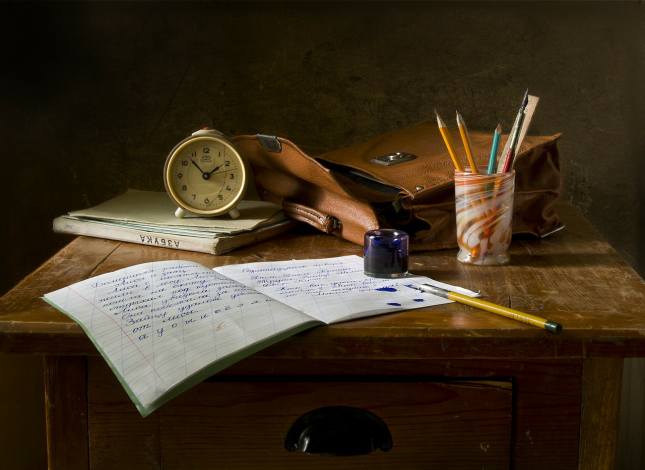
Melbourne offers some excellent education. Image credit: Pixabay
Many people who choose to emigrate to Melbourne do so with children.
This does add another layer of concern for parents.
Will the education provision rival that of the UK? Is it easy to enrol my child into a school in Melbourne? Is the curriculum similar to the UK? These are a few of the concerns parents may ask themselves.
It is good to know that the standard of education right across the country is excellent.
The Australian Government is particularly focused on diversity and much time money and effort is placed on teaching and student support systems.
Parents have the option of choosing either public, private or international schools. Each has its own merits and of course other than public education there will be cost implications.
In Victoria, children are required to attend school from the age of 6 to 12.
To enrol in a government school, a child must turn 5 before the 30th of April in the year they commence their schooling.
Primary school students are between the ages of 5 and 12, and classes are divided into Prep and Years 1 to 6. Secondary school students are between the ages of 12 and 20.
You can discover more about how the education system works in Australia here.
- Best Private Schools in Melbourne
- Best Public Schools in Melbourne
- Best Special Schools in Melbourne
Public Transport
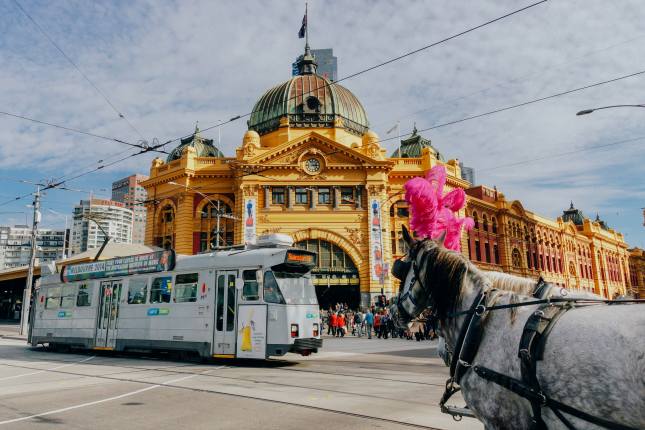
Flinders Street Railway Station, Melbourne. Image credit: Unsplash
Melbourne has one of the best public transport systems in Australia, offering several services including trains, buses, and trams (also known as trolleys or streetcars).
Public Transport Victoria (PTV) manages the city’s public transport.
The Myki card is the ticketing system used on Melbourne’s public transport network.
It is a reusable smart card that stores value to pay for travel on trains, trams, and buses. You can purchase a Myki card from retail outlets displaying the Myki sign, visitor centres and all train stations.
The transport system is divided into two zones: Zone 1 and Zone 2. Zone 1 covers the central business district and inner suburbs, while Zone 2 covers the outer suburbs.
The city also offers free tram rides within the city centre.
To use public transport outside of the free tram zone, you need to purchase a Myki card.
Driving in Melbourne
Navigating Melbourne’s roads is generally considered straightforward, thanks to its extensive network of well-maintained thoroughfares.
Driving is on the left-hand side of the road.
It is crucial to be aware that the police enforce stringent driving laws to prioritise the safety of drivers and their families.
Before hitting the road in Melbourne, ensure you possess a valid driver’s license.
Information on obtaining a driver’s license can be found on the VicRoads website.
Every vehicle in Victoria must be registered with VicRoads, and all registered vehicles must hold a Certificate of Roadworthiness.
Additionally, it is advisable to have car insurance in place to safeguard your vehicle in the event of an accident or damage
Sports Culture
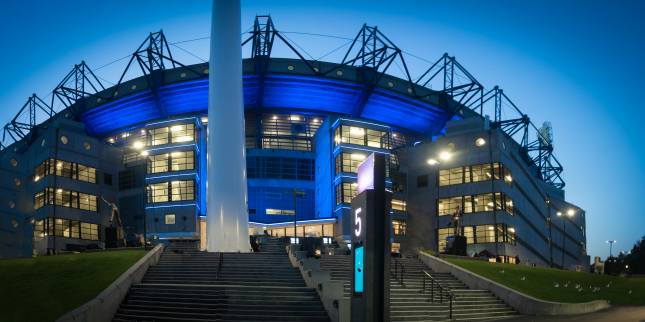
Melbourne Cricket Ground. Image credit: Depositphotos
Melbourne is widely recognised for its strong and vibrant sporting culture. Sport is often the main topic at barbecues and other social events.
The city has a deep passion for a variety of sports, and it hosts numerous major sporting events throughout the year.
Having originated in Victoria in 1896, the Australian Football League is a huge part of Melbourne’s culture.
Don’t be surprised if one of the first questions you are asked is “Who do you support” or as the Aussies say, “Who do you barrack for” .
Some key aspects of Melbourne’s sporting culture include:
Australian Rules Football (AFL): Melbourne is considered the heartland of Australian Rules Football, and the city fervently supports its local AFL teams, including the Melbourne Demons, Essendon Bombers, and Collingwood Magpies.
Cricket: The Melbourne Cricket Ground (MCG) is one of the most iconic cricket stadiums globally. Cricket holds a special place in the city’s sports culture, and matches at the MCG, especially during events like the Ashes or the Boxing Day Test, draw significant attention.
Tennis: Melbourne hosts the prestigious Australian Open, one of the Grand Slam tournaments in tennis. The event attracts top tennis players and a large international audience.
Horse Racing: The Melbourne Cup, held annually at Flemington Racecourse, is one of the most celebrated horse racing events worldwide. It is known as “the race that stops the nation.”
Soccer (Football): Melbourne has multiple soccer teams competing in the A-League, and the sport has a growing and passionate fan base.
Rugby: While not as dominant as in some other Australian cities, rugby has its presence in Melbourne, with teams participating in national competitions.
Basketball: The Melbourne United basketball team competes in the National Basketball League (NBL), contributing to the city’s diverse sports scene.
Unusual Nature & Wildlife
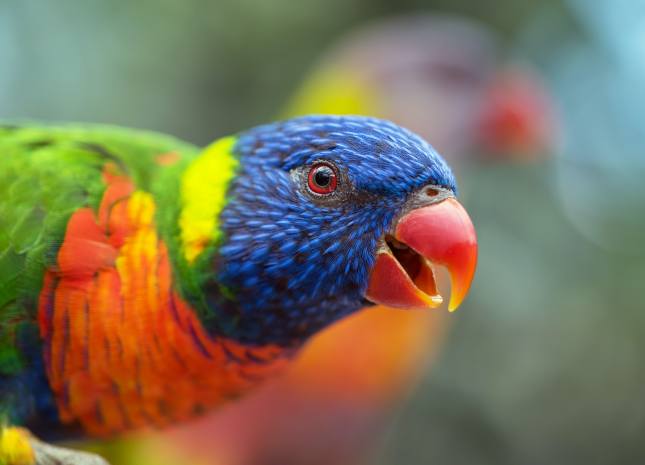
Rainbow Lorikeets are a stunning inhabitant of Melbourne. Image credit: Unsplash
Even though some parts of Melbourne support large industrial, commercial, and residential areas, it is surprisingly home to many unusual species not found in other areas of Australia.
Rainbow Lorikeets are often seen inhabiting parks and gardens across the city.
The Common Ringtail Possum is one of two found in Melbourne.
They are less of a nuisance to residents than the more common varieties.
The Sulphur-crested Cockatoo is a very noisy bird and a common sight in the city and countryside surrounding it.
Some can live for as long as 100 years!
The Grey-headed Flying Fox weighs up to one kilogram and is identified by a grey or whitish-grey head, rusty brown fur encircling the neck and grey to dark brown body fur.
These fruit bats congregate in permanent camps of a few hundred up to 200,000 individuals.
Bringing your Pets to Melbourne

Plan ahead if you are thinking of taking your pet to Melbourne with you. Image credit: Pexels
Many expats want to bring their domestic animals with them to Melbourne.
Importing pets involves a series of steps to ensure the safety and compliance with Australian quarantine and biosecurity regulations.
First, you will need to obtain an import permit from the Australian Department of Agriculture, Water, and the Environment. You will need to apply for this well in advance.
It is also important to remember that moving animals abroad can be very stressful for them.
Plus, upon arrival in Melbourne, they must undergo a minimum 10-day quarantine before you can take them home.
Quarantine space must be booked in advance.
Arrange pet transport with a company that is a member of IPATA (The International Pet and Animal Association).
Members are industry-regulated ensuring you get the best service for your beloved animal.
Their website provides all the relevant information you need to know about transporting your pet to Melbourne.
Packing & Moving Your Effects to Melbourne
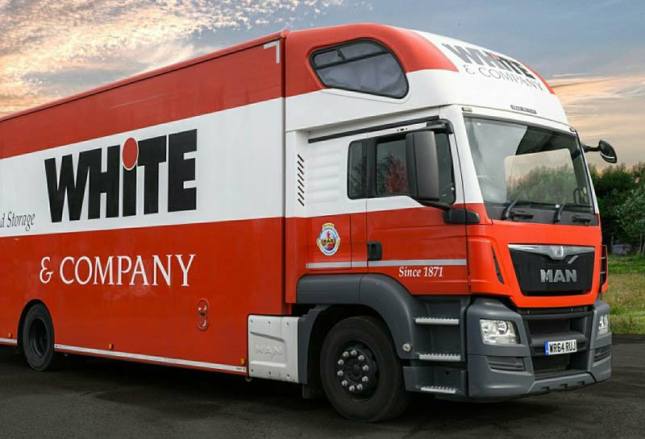
White & Company Truck
When the time comes, and you need an experienced and reliable international removal firm to wrap, pack and transport your personal effects to Melbourne, reach out to White & Company.
We specialise in regular removals to Australia, offering comprehensive services such as full and part loads ensuring your belongings go from A to B as quickly as possible.
If storage is needed, we offer accredited facilities adhering to European standards.
Our dedicated partners in Australia will meticulously handle all paperwork and customs clearance, overseeing the unloading and unpacking of your household goods.
For more details on shipping goods to Australia, contact our international office at 01489 854175 and consult with one of our international relocation experts.
Alternatively, fill out a quick quote form, and a member of our team will reach out to you shortly.

Max is a seasoned writer and blogger in the real estate and home moving sectors, as well as a knowledgeable source of information for expatriates living and working abroad. His detailed insights have helped thousands of people move and live abroad with greater simplicity and ease.
Posted in: News
Leave a Comment (0) ↓


